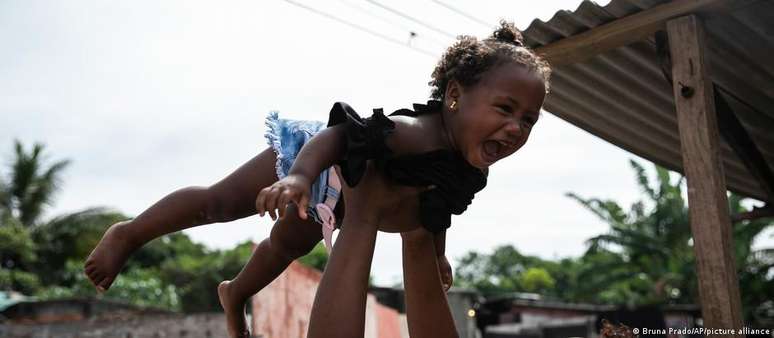A mother’s love is not and has never been experienced in the same way by all women. The fear that grips the hearts of mothers of black children is constantly linked to the lack of freedom – Put on a coat, my son!
– We will buy it when we return, daughter.
It’s very likely that many of us have already heard some of these catchphrases uttered by our mothers. Phrases that are generally linked to the care they have for their sons and daughters, within the broad spectrum of what constitutes “mother’s love”.
The frequency of these catchphrases over time and in the most diverse socio-economic spaces is such that another one was born: “the mother is all the same, she just changes her address”.
Truly?
I will not enter here into the important debate on what motherhood means, especially in the current era in which the majority of women work inside and outside the home, as well as often being heads of families and/or single mothers, and, even when they manage to establish a good cooperation with the parents of his children and continues to carry the historical weight of the mental burden that organizes the daily life of his family.
Here I will use the causality of celebrating Mother’s Day 2024 one day before May 13, when we will celebrate the 136th anniversary of the abolition of slavery, to think about how, in Brazil, this “mother’s love” is not and never is been experienced in the same way by all women.
A perception that I already had, but which became better highlighted after listening to the prosecutor Livia Sant’Anna Vaz describe the advice that mothers of black boys give to their children in 2024: “don’t wear a hood, even if it rains”, ” Don’t carry or open an umbrella, you better catch a cold, but get home alive.”
It is the love of a mother in its raw state, of women (mostly black) who know that their children are constant targets of police actions in cities like Salvador and Rio de Janeiro, where black boys are treated as potential criminals just because I am I am.
Fear that has to do with lack of freedom
And it’s not just the police that black children can become victims of. Recently, the case of racism suffered by a black girl in an elite school in São Paulo attracted the attention of the media and public opinion, reminding us that racism does not respect social class: it is a knife in everyone’s head black. person. A knife that mothers try to remove from their children’s lives, but which is always there, reminding us that the fear that grips the hearts of mothers of black children is different. Because it is a fear that constantly deals with the lack of freedom.
This fear has a long history here. But contrary to what we might imagine, this is not the fear that paralyzes you or leaves you stuck in place. In some ways, caring for mothers of black children, especially black women who have black children, is a combative fear, a fear that drives the fight.
And this struggle also has a long history. We still know very little about the popular character of the abolition of slavery in Brazil. We know some “classic” names (usually white abolitionists) and are currently expanding our repertoire on the lives and trajectories of black abolitionists. But there was a more banal and everyday dimension to abolitionism, which often escapes us.
Well, it is crucial to remember here that black women’s motherhood was transformed into an important advertisement for the Brazilian abolitionist movement. On the one hand, “mother’s love” became common ground between free white women and enslaved black women in Brazil in the late 19th century. Remembering that enslaved women were also mothers was a way that abolitionists used to soften women’s hearts. Most progressives denounced the horrors of slavery and remembered that there was something in common between enslaved people and those who could potentially be enslaved. the owners.
However, the “mother’s love” that really moved the structures of the country was that of the black and enslaved women who were able to exploit the loopholes of the abolitionist laws to guarantee the freedom of their children.
While the Free Womb Law of 1871 guaranteed the freedom of children born to a slave womb after its enactment, it also allowed the owner of the slave mother to choose between giving immediate freedom to the newborn, for a modest fee, or use the child’s work until he or she turns 21. I don’t even need to say which option is chosen by most Brazilian owners.
In contrast to this lordly position, black and enslaved women left the corners of Brazil and traveled for days – counting on a powerful network of help and affection – to arrive at the Empire’s court and beg for the immediate freedom of their sons and daughters. Many succeeded, many others did not, but this movement joined other abolitionist actions, shaking the entire society.
They were women who, by affirming the type of mother they could be, reconfigured the dimension of “maternal love”, and made it the fuel for the fight for the freedom of their sons and daughters and for the end of slavery in the country.
—
Master and doctorate in Social History at USP, Ynaê Lopes dos Santos is professor of History of the Americas at UFF. She is the author of the books Além da Senzala. Slave Quarter Agreements in Rio de Janeiro (Hucitec 2010), History of Africa and Afro-Descendant Brazil (Pallas, 2017), Juliano Moreira: Black Doctor in the Founding of Psychiatry in Brazil (EDUFF, 2020), and Brazilian Racism: a story of the country’s formation (Todavia, 2022), and also responsible for the Instagram profile @nossos_passos_vem_de_longe.
The text reflects the opinion of the author, not necessarily that of DW.
Source: Terra
Rose James is a Gossipify movie and series reviewer known for her in-depth analysis and unique perspective on the latest releases. With a background in film studies, she provides engaging and informative reviews, and keeps readers up to date with industry trends and emerging talents.




![Tomorrow belongs to us: What awaits you in the episodes of 2052 and 2053 on October 15, 2025 [SPOILERS] Tomorrow belongs to us: What awaits you in the episodes of 2052 and 2053 on October 15, 2025 [SPOILERS]](https://fr.web.img6.acsta.net/img/39/95/3995a2d00abbf3c01161818d01a95388.jpg)

